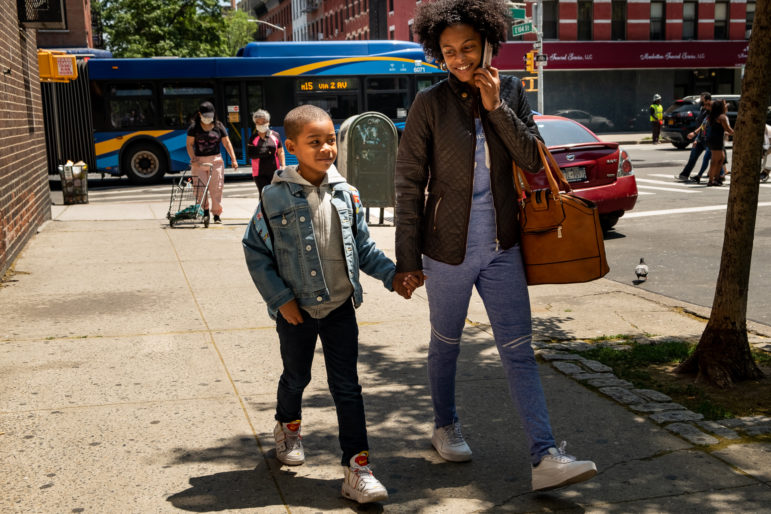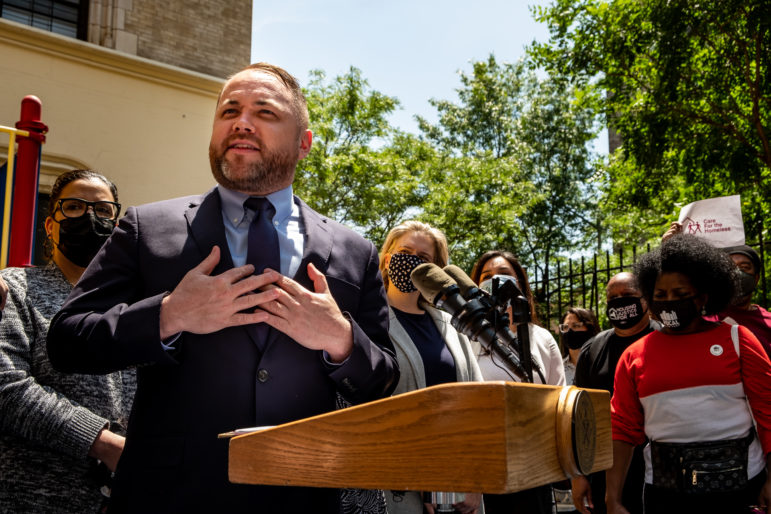The bill would raise the value of city-backed housing subsidies for New Yorkers experiencing homelessness. The voucher values currently trail actual market rents, making it hard for families to find a landlord willing to accept them.

Adi Talwar
Lavera Martino and her son Takai walk along East 104th Street. Martino said they have a CityFHEPs rental voucher but have been unable to find a landlord willing to accept it.Lavera Martino and her son Takai stood at a crosswalk and watched as Council Speaker Corey Johnson headed down Second Avenue in East Harlem Tuesday afternoon.
Johnson had just left a rally outside a family homeless shelter where he announced the council will vote Thursday on a long-awaited measure to raise the value of city-backed housing subsidies for New Yorkers experiencing homelessness. The current voucher values trail actual market rents, making it hard for families to find a landlord willing to accept the subsidy, known as the CityFHEPS program.
“I’m literally in that predicament right now,” said Martino, 26. Her CityFHEPS voucher would cover a maximum rent of $1,323 a month, far less than the price of apartments she has seen. Raising the value, she said, “is the only way people can get out of shelter.”
Takai, 6, added his perspective: “I don’t want to grow up in a shelter.”
For years, homeless New Yorkers and their advocates have said the same thing. But the legislation, first introduced by Councilmember Stephen Levin in 2018, continued to stall. Johnson declined to bring it up for a vote and Mayor Bill de Blasio opposed the increase without a concurrent hike to the state’s rental subsidy.
On Tuesday, however, Johnson said that the continued efforts of advocates, the impact of the COVID-19 pandemic, and the approaching end of eviction protections changed the calculus, compelling him to bring the measure to a vote at the council’s next meeting Thursday. The bill, Intro. 146, has a veto-proof 40 sponsors and support from powerful real estate and landlord groups.
“We cannot ask all of these folks who are struggling, who were struggling before the pandemic, who were struggling and the pandemic has made things worse, we cannot expect folks to get the help they need without a stable, permanent roof over their heads,” Johnson said. “That’s what this is going to do. It’s going to move thousands of families, thousands of individuals, thousands of children out of shelter and into permanent housing.”
CityFHEPS vouchers are currently capped at $1,265 a month for a single adult and $1,580 for a family of three or four. Intro. 146 would raise the rate to match the value of federal Section 8 subsidies, which are determined based on the Fair Market Rent set by the Department of Housing and Urban Development (In New York City, Section 8 subsidies cover one-bedroom apartments priced at $1,945 per month and two-bedroom apartments priced at $2,217.)
The voucher legislation would also prevent vouchers from expiring, giving New Yorkers more time to find an apartment—an issue for about 80 percent of current voucher holders, Levin said.
A total of 48,235 people, including more than 15,000 children, stayed in a Department of Homeless Services shelter on May 23, according to the city’s most recent daily census.
Christine Quinn, head of family shelter provider Win and the former City Council speaker, has championed the voucher increase, commissioning a study that determined doing so would allow 2,600 to 2,700 families to move out of shelter over five years. Current voucher-holders could not afford the average rent in a single neighborhood in New York City, the Win analysis also found.
“What’s worse than giving somebody no hope? Giving them false hope. And that’s what the city has done for years and years and years,” Quinn said Tuesday outside a Win shelter.
The de Blasio administration has pushed back against that assessment, however. Department of Social Services Commissioner Steven Banks pointed out at a Council hearing May 10 that thousands of New Yorkers have managed to find a place to live using their vouchers. The mayor’s office did not respond to a request for comment Tuesday.
Voucher holders also face the pervasive problem of source of income discrimination, where brokers and landlords refuse to accept rental subsidies because of anti-poverty bias or as a proxy for erecting racist housing barriers. The higher value could help overcome those biases, advocates say.
The voucher fight has taken on a new urgency in recent months, as state eviction protections near an end. Johnson, a candidate for city comptroller, has also faced pressure to bring the bill to a vote. Earlier this month, advocates rallied outside his home and his office, urging him to bring the legislation to the Council floor.
Several speculated that Johnson did not want to vote on the bill, which would carry an estimated $47 million upfront price tag, as he nears a citywide election to oversee municipal finances. One of his colleagues and comptroller competitors, Councilmember Brad Lander, even launched a website questioning Johnson’s reluctance to vote on Intro. 146.
At the rally, Quinn sought to pin the blame for the delayed vote on de Blasio.
“Make no mistake, it was Mayor Bill de Blasio who was opposed to this bill,” said Quinn. “It was Mayor Bill de Blasio who kept saying no.”
Johnson later told City Limits that politics played no part in his decision-making. “I hadn’t really thought of that,” he said.
He said he had worked behind the scenes to urge state lawmakers to also increase the state’s FHEPS value in the most recent budget, to prevent the city from bearing a disproportionate burden for homeless services and housing. Advocates, including the Coalition for the Homeless, have disputed that theory.
Though the state did not raise its voucher value, Johnson said he decided it was time to pass the city-level increase.
“The fear was if we raised the CityFHEPS voucher amount and not the state FHEPS voucher amount, it would create a huge cost shift to the city, but given where we are with COVID and the number of homeless families we see in shelters and hotels, we can’t wait another year. It’s not possible to wait another year with this crisis that we’re in,” he said. “We finally had to move on this.”

Adi Talwar
City Council Speaker Corey Johnson at a press conference Tuesday, where he announced that he’ll be bringing Intro. 146 up for a vote this week.The renter-friendly housing market also spurred the decision to hold the vote, he said.
“If the housing market goes up again, and rents start to increase, then so many of these families are going to be left out again,” he said. “While the market is soft right now and a lot of apartments are available, we can’t wait any longer.”
Johnson challenged the de Blasio administration position that the city should not rely on federal stimulus funding to kickstart the voucher value increase. New York City will receive $5.9 billion from the federal government’s COVID recovery measures.
“We have to be careful because we have to look at that money as a one-time thing,” Johnson said. “But if we can tap into some of that money given the epidemic of homelessness that we have in New York City right now, we have to take the opportunity to do so.”
Advocates say the extra cost will be more than offset by savings on shelter and hotels used to house homeless individuals and families. In 2019, shelter and related services for families cost the city $158 per night, or over $4,700 a month, according to data from the Department of Homeless Services. The average cost of rooms and services at hotels used to house families was $237 per night, or more than $7,100 per month, the data shows.
In contrast, the vouchers would cost less than half that.
“It doesn’t make sense to spend that much money on hotel rooms when we could be paying for permanent affordable housing for families,” Johnson said. “I think this is a financially sound thing to do and a morally right thing for the city of New York.”
City Limits’ series on family homelessness in New York City is supported by Citizens’ Committee for Children of New York and The Family Homelessness Coalition. City Limits is solely responsible for the content and editorial direction.










2 thoughts on “Council Will Hold Long-Awaited Vote to Raise Value of NYC Housing Vouchers”
For too long writers like yourself have only focused on one group of people in this housing dilemma, while those more vulnerable are left out in the cold! Single men and women without children are like a forgotten nation trudging along in silence. The working poor who cannot get wages better than $10.00 an hour, trying desperately to provide for themselves without the benefit of having community support behind them! Physical illness is also a big factor in people not being able to find adequate housing! And the city plays a role in allowing delinquent slum landlords to keep neglecting their properties, giving little more than a slap on the wrist for multiple violations going back decades and all because many of these landlords make sizable contributions to various political campaigns of many running and aspiring to run for office! We are continuously in a vicious cycle of everyone passing the buck, and no one held accountable! Focus on the others as well, the homeless elderly, or the those too ill to work a full time job, but needing disability only to get the constant runaround from those who are supposed to be doing their job! No one should be living in a shelter for 10 years, no one should be in a shelter for 5 years, and unless greater focus is given to all affected not much will change over the long haul!
Advocating for years on the subject of housing not handcuffs, which was the real issue of the present Shelter system approach to housing the homeless is the cost of living in shelter versus housing. Finally the need for housing not shelter will take on a path that would hopefully change the discrimination many face however I am pessimistic of the affordable housing market and the systemic concerns still in place with the eligibility factors being abused by private developers and property managements who have deliberately skirted the individuals concerns solely to accommodate another individual who may be more suitable for the unit by numerous reasons not necessarily evident in their disqualification determinations. Mental Health, past criminal history are just two of many of the most many homeless New Yorkers face in the housing crisis.